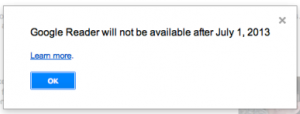
Yesterday, Google announced that it was pulling the plug on its popular feed reading service Google Reader. In its post, Google cited a waning interest and usage in Google Reader and a need for Google to focus on fewer products.
The move, however, has not been taken well by bloggers and journalists. Google Reader’s users, though dwindling in number, appear to be very passionate about their product. There are already petitions for Google to reconsider, including one that was briefly posted on the White House site before being deleted.
But while users of Google Reader are scrambling to find workable alternatives, the death of Google Reader raises serious questions for all webmasters, whether they use the service or not.
For years, Google Reader and its users have made up the core of RSS readership. For some time, Google Reader has been the most popular RSS reader and its death doesn’t just leave a crater in that particular market, it also leaves behind significant unanswered questions about the role of RSS moving forward.
Because, while many are quick to proclaim that RSS is dead, the truth is that the technology still powers much of the Web, including social media.
However, if there were ever a time to rethink your RSS strategy, this is most likely it.
How RSS Has Changed

When I first started Plagiarism Today in 2005, RSS scraping was a hot button issue.
Spammers, at that time, were routinely scraping full feeds to fill their spam blogs and Google was doing a poor job of determining originality, setting the stage for many bloggers to get beaten by their own content on other sites.
While that problem remains today, better originality detection by Google and the rise of other spamming methods made it less of an issue. Still, even when RSS scraping was at its peak, using a truncated feed was widely considered a bad move.
In 2006, I repeatedly came out against the use of truncated feeds, calling them a temporary solution and proudly explaining why I used full feeds.
However, by 2011, it was obvious that technology was changing RSS feeds. Twitter and Facebook were changing how RSS was used and, even at that point, many popular blogs were dropping the iconic RSS buttons.
In 2012, I was wondering if it was time to rethink partial feeds and if my advice from six years prior still held weight. In the end, I encouraged everyone to look at their situation, decide how much readership they had via RSS versus social media and act accordingly.
Today though, the question is more relevant than ever. With Google Reader closing and the Web losing the most popular feed reading tool, the audience for RSS content is, almost certainly, going to diminish greatly.
In short, if you haven’t made the switch to a truncated feed before, now may be the time.
Reader Quantity vs. Reader Loyalty
As I said in my 2012 post, the biggest obstacle to going from a full to a truncated feed is not that the move will upset a majority or even a sizable percentage of users, but that it will upset your most loyal.
Next to email, RSS readers are among the most dedicated, typically reading and sharing content more regularly than those who participate simply via social media.
However, many of those loyal readers will soon be without a dedicated way to read your site and it is unclear where they will land. Though there are many posts out there touting Google Reader alternatives, it’s also likely most will simply rely more heavily on social media.
So what is a webmaster to do? With RSS scraping still a threat (albeit a smaller one) and at least one Israeli court ruling it legal there’s a lot of reasons to consider truncating your feed or make it headline-only.
The only way to know for certain is to study your audience and, if needed, ask them directly. While it’s not a “one-sized fits all” solution, its the best and most honest as every site is different.
Still, the one thing that is clear is that now is the time to be asking those questions, not June 1st when that audience may well be gone.
Bottom Line
In the end, it’s difficult to predict how this will shake out. It’s rare for an industry like RSS readers to suddenly lose its market leader like this. Google Reader has long since destroyed its best competition and most competitors either depend heavily on it or at least integrate with it.
An example of this is that FeedDemon is also closing down following Google’s announcement. This impact of this closure goes well beyond Google Reader itself.
On one hand, it could mean that Google Reader’s users scatter to other technologies and RSS becomes merely a pipeline tool for feeding social media as well as scrapers. Those that continue to read via RSS will simply be more and more isolated from most Web users.
On the other, the giant leaving the room could give an opportunity for other companies to innovate and do new things with RSS reading, things that might give it a chance for broader adoption long-term.
When it’s all said and done, the closing of Google Reader won’t be the end of the conversation about the role of RSS in blogging. Rather, it may well be just the beginning.
No matter what decision you make now, it’s important to be mindful of future changes and alter your strategy accordingly.
As the past eight years have shown, what’s right today may not be what’s right tomorrow.